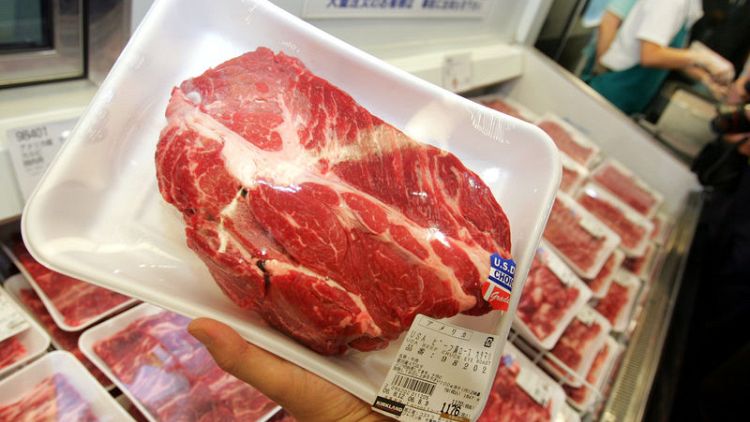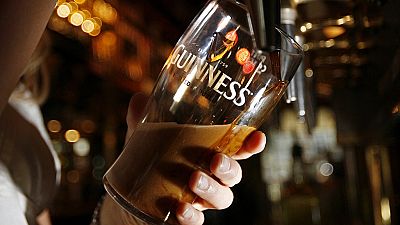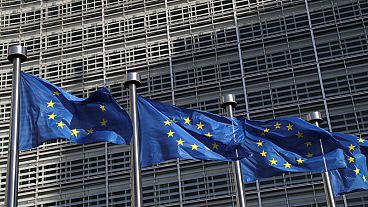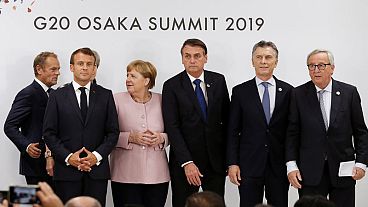By Kaori Kaneko, Linda Sieg and Tom Polansek
TOKYO/CHICAGO (Reuters) - U.S. beef exporters, unhappy after President Donald Trump pulled out of a multilateral trade pact in 2017, stand to sell more meat in Japan after the U.S. leader and Japanese Prime Minister Shinzo Abe cut a deal to slice into tariffs.
But agriculture experts say that for now, that boost may be lean: exports of U.S. beef to Japan are already high enough to be close to a "safeguard" level at which higher tariffs kick in.
The deal Trump and Abe signed on Wednesday will cut tariffs on U.S. agricultural products, including beef, to around levels granted to signatories of the multilateral Comprehensive and Progressive Agreement for Trans-Pacific Partnership.
The new agreement between Washington and Tokyo stands to benefit big U.S. beef processors such as Tyson Foods Inc <TSN.N>, JBS USA and Cargill Inc. The companies are separately hoping to cash in from tighter meat supplies in Asia that have been hurt by an outbreak of African swine fever, a fatal pig disease.
Privately held Cargill told Reuters it expects to see an increase in meat sales to Japan if the deal is finalized.
"It levels the playing field and creates additional opportunities for farmers, ranchers and companies like Cargill to serve an important international market," Cargill said.
Tyson, JBS and National Beef Packing Company did not immediately respond to requests for comment.
Tyson has historically been a sizable exporter to Japan and should benefit from the bilateral agreement, said Heather Jones, founder and senior equity analyst at Heather Jones Research.
"U.S. exporters have definitely been disadvantaged this year due to the U.S. not being part of the trade deal inked late last year," she said.
For a graphic on U.S. beef and agriculture product exports to Japan look set to rise following new trade deal:
https://fingfx.thomsonreuters.com/gfx/ce/7/6641/6623/USBeeftoJapan.png
'LEVEL PLAYING FIELD'
Ahead of next year's U.S. presidential election, lower tariffs should help Trump soothe U.S. farmers, a key electoral constituency. They have been hurting from the U.S.-China trade war, even as they were still smarting from the loss of low-tariff prospects in the multilateral TPP that 11 nations signed in 2018.
Trump walked away from an original 12-member agreement, known as the Trans-Pacific Partnership (TPP), in 2017.
The primary goal for U.S. exporters with the bilateral deal was to protect access to the Japanese market, rather than increase sales, analysts said.
Japan is already the biggest export market for U.S. beef, with sales of $2.1 billion last year.
The U.S. Meat Export Federation, an industry group that represents suppliers, projects American beef sales to Japan will increase to $2.3 billion in 2020 as the trade deal levels the playing field on tariffs for suppliers.
Cassie Fish, a U.S. beef expert and former Tyson executive, said that while the deal may not significantly boost U.S. beef exports to Japan, it would prevent a decline.
"I thought it was more friendly that 'Oh good, we're not going to mess up our Japan trade," she said.
Japan will permit lower import tariffs on 242,000 tons of U.S. beef in fiscal 2020, with that quota rising to 293,000 tons in fiscal 2033. Japan imported 254,529 tons of U.S. beef in the latest fiscal year through the end of March.
Tariffs on U.S. beef imports, currently 38.5%, will fall in stages to 9% by fiscal 2033. TPP-11 members - such as Australia - saw tariffs fall to 26.6% this year after the pact took effect in December 2018 and will see further decreases to 9%, also by fiscal 2033.
"Since beef imports are close to the safeguard level, it's hard to think imports from America will rise rapidly," said Junichi Sugawara, a senior researcher at Mizuho Research Institute.
MARKET AT RISK
The North American Meat Institute, which represents U.S. beef packers, said the new agreement will make it easier for the United States to compete for business in Japan with the EU and countries in the TPP-11.
U.S. producers particularly wanted a deal that removed the tariff advantage for beef from top rival Australia.
Japan's imports of U.S. beef grew 10.3% in fiscal 2018/19 from the previous year, with their share of the market for imported beef remaining steady at about 41%. Imports from Australia, America's main competitor, rose 4.1% while their market share dipped a bit, to 50% from 52.1%.
"If we didn't have this deal we would see significant loss in that market," said Troy Bockelmann, analyst for U.S. consultancy CattleFax.
A Japanese farm ministry official said beef imports are affected by several factors, including exchange rates, price and customer preferences, not just tariffs.
Trump on Wednesday praised the overall U.S.-Japan deal, which he said would open up Japanese markets to $7 billion worth of U.S. products, as a "huge victory for America's farmers, ranchers and growers".
"The U.S. can tell its farmers, who are in a pinch, that it won concessions from Japan," said Takashi Imamura, a general manager at Marubeni Corp's research institute. "But considering the scale of America, $7 billion is not such a big achievement."
(Reporting by Kaori Kaneko and Linda Sieg in Tokyo and Tom Polansek in Chicago; Writing by Linda Sieg; Editing by Kenneth Maxwell and David Gregorio)



